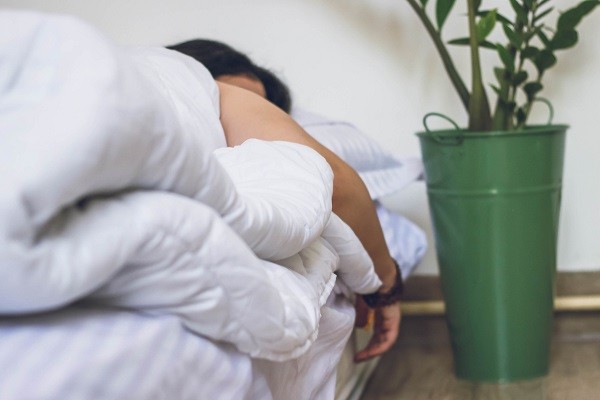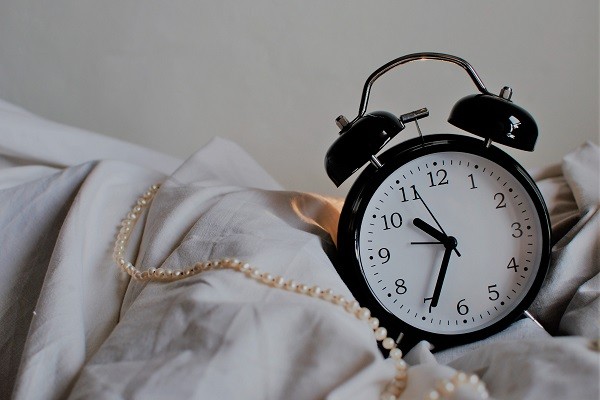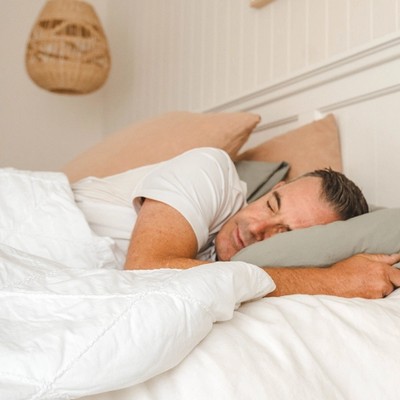The Importance of Sleep for Fat Loss and Muscle Growth

How will sleep affect my fat loss?
With many of us wanting to lose weight, one of the first things to get right is our shuteye. Research shows the quality of your sleep is directly related to how much fat you lose.
Another study into overweight or obese adults placed them on a diet for 8 weeks and split them into two groups; a controlled sleep group (they slept as they normally would) and a sleep-deprived group. Those in the sleep-restricted group were instructed to reduce their time in bed for 5 nights and to sleep for as long as they'd like for the remaining two nights. Both groups ate at 95% of their resting metabolic rate (which would result in fat loss for all).
What effect did sleep have on their fat loss?
Well, the total amount of mass lost from fat was significantly greater in the group who slept more. The authors concluded that approximately one hour of restricted sleep for five nights a week led to less fat loss. Interestingly to note was that the "catch up" two days of sleep the restricted group were told to have, didn't reverse the negatives fat loss effects in this study.
So adequate sleep is critical for you when you're looking to lose fat, and even an hour less sleep across five days can prove costly!
How will sleep affect my muscle growth?
Sleep has a dramatic effect on muscle mass. One study found that an enormous 80 per cent of lost scale weight was lean muscle when subjects slept just 5.5 hours every night for 14 days! These study subjects (3 women and 7 men) underwent 14 days of a moderate calorie deficit and were randomised to either sleeping 8.5 hours or 5.5 hours.
So, when we're dieting for fat loss (and obviously want to keep our muscle mass) adequate sleep is critical. (We'll get to how much in a moment).
Moreover, lack of sleep obviously impairs your performance in the gym. How many times have you had a half-baked sleep only to turn up in the gym with little to no energy, and lifting next to nothing?

And even if you get enough sleep and have a good workout, you better then get enough recovery sleep. Even one night of poor sleep can drastically affect your muscle gains!
In this study into seven males and six females, the subjects were randomised to either one night of total sleep deprivation, and/or a normal night's sleep. They wanted to see what effect this had on anabolic (muscle building) hormonal responses and catabolic (muscle wasting) markers. They reported a reduced muscle protein synthesis rate of 18 per cent in the sleep derived group and an increase in the stress hormone cortisol by 21 per cent. To make it even worse, plasma testosterone was decreased by 24 per cent!
So basically, one night of no sleep halts muscle growth pretty significantly...
So, the next time you're having a big night out after a gym session, think again!
How much sleep do I need?
This is the next obvious question, with research suggesting it depends on our age:
- Teenagers (14-17) years are recommended to get 8-10 hours of sleep.
- Young adults (18-25 years) are recommended to get 7-9 hours of sleep
- Adults (26-64 years) are recommended to get 7-9 hours of sleep
- Older adults (65 +) 7-8 hours.

Sleep and mental performance
Not surprisingly, research shows sleep is just as important for your cognitive performance (including learning and memory), and positive moods.
Moreover, we need to cut out screens before bed for adequate sleep. We're talking about iPads, smartphones, etc. A recent review found:
"Media device access and use at bedtime are significantly associated with detrimental sleep outcomes, and lead to poor health outcomes."
Research into this is in its infantry stages, but the picture for device access is looking bleak! Stay away from your screens before bed for optimal muscle growth and fat loss!
The situation is so bad, that some researchers in America are pushing for later school starting hours for adolescents to ensure they get more sleep because they aren't putting their phones away at night.
The bottom line is we need to get enough sleep according to the aforementioned recommendations. The old advice of 8 hours is sufficient, with up to 9 being beneficial, too. Sleep will help us lose more weight, maintain muscle mass, and grow more too, whilst allowing for better mental function, and a better mood!

Dayne Hudson
Like many, Dayne was once desperate to lose weight and get into shape. But everyone he asked, everything he read, lead to the same place... nowhere.
His journey started there - researching science journals and completing a Sports Nutrition Specialist qualification so he could make weight loss easier.
References:
- Adolescent Sleep Working Group; Committee on Adolescence; Council on School Health. School start times for adolescents. Pediatrics. 2014 Sep;134(3):642-9. doi: 10.1542/peds.2014-1697. PMID: 25156998; PMCID: PMC8194457.
- Carter B, Rees P, Hale L, Bhattacharjee D, Paradkar MS. Association Between Portable Screen-Based Media Device Access or Use and Sleep Outcomes: A Systematic Review and Meta-analysis. JAMA Pediatr. 2016;170(12):1202-1208. doi:10.1001/jamapediatrics.2016.2341
- Chaput JP, Dutil C, Sampasa-Kanyinga H. Sleeping hours: what is the ideal number and how does age impact this?. Nat Sci Sleep. 2018;10:421-430. Published 2018 Nov 27. doi:10.2147/NSS.S163071
- Chaput JP, Tremblay A. Sleeping habits predict the magnitude of fat loss in adults exposed to moderate caloric restriction. Obes Facts. 2012;5(4):561-6. doi: 10.1159/000342054. Epub 2012 Jul 27. PMID: 22854682.
- Foerster M, Henneke A, Chetty-Mhlanga S, Röösli M. Impact of Adolescents' Screen Time and Nocturnal Mobile Phone-Related Awakenings on Sleep and General Health Symptoms: A Prospective Cohort Study. Int J Environ Res Public Health. 2019;16(3):518. Published 2019 Feb 12. doi:10.3390/ijerph16030518
- Hirshkowitz M, Whiton K, Albert SM, Alessi C, Bruni O, DonCarlos L, Hazen N, Herman J, Adams Hillard PJ, Katz ES, Kheirandish-Gozal L, Neubauer DN, O'Donnell AE, Ohayon M, Peever J, Rawding R, Sachdeva RC, Setters B, Vitiello MV, Ware JC. National Sleep Foundation's updated sleep duration recommendations: final report. Sleep Health. 2015 Dec;1(4):233-243. doi: 10.1016/j.sleh.2015.10.004. Epub 2015 Oct 31. PMID: 29073398.
- Knowles OE, Drinkwater EJ, Urwin CS, Lamon S, Aisbett B. Inadequate sleep and muscle strength: Implications for resistance training. J Sci Med Sport. 2018 Sep;21(9):959-968. doi: 10.1016/j.jsams.2018.01.012. Epub 2018 Feb 2. PMID: 29422383.
- Lamon S, Morabito A, Arentson-Lantz E, et al. The effect of acute sleep deprivation on skeletal muscle protein synthesis and the hormonal environment. Physiol Rep. 2021;9(1):e14660. doi:10.14814/phy2.14660
- Maquet P. The role of sleep in learning and memory. Science. 2001;294:1048–52.
- Nedeltcheva AV, Kilkus JM, Imperial J, Schoeller DA, Penev PD. Insufficient sleep undermines dietary efforts to reduce adiposity. Ann Intern Med. 2010 Oct 5;153(7):435-41. doi: 10.7326/0003-4819-153-7-201010050-00006. PMID: 20921542; PMCID: PMC2951287.
- Pilcher JJ, Huffcutt AI. Effects of sleep deprivation on performance: A meta-analysis. Sleep. 1996;19:318–26.
- Wang X, Sparks JR, Bowyer KP, Youngstedt SD. Influence of sleep restriction on weight loss outcomes associated with caloric restriction. Sleep. 2018 May 1;41(5). doi: 10.1093/sleep/zsy027. PMID: 29438540.
Related Blogs

Optimise Sleep, Reduce Stress, and Rest to Build More Muscle
Posted by Bulk Nutrients
Estimated reading time: 7 minutes

Flexible Sleep for Recovery: The 90 Minute Sleep Cycle
Posted by Bulk Nutrients
Estimated reading time: 8 minutes

ZMA for Improved Health, Immunity and Sleep
Posted by Bulk Nutrients
Estimated reading time: 2 minutes




























